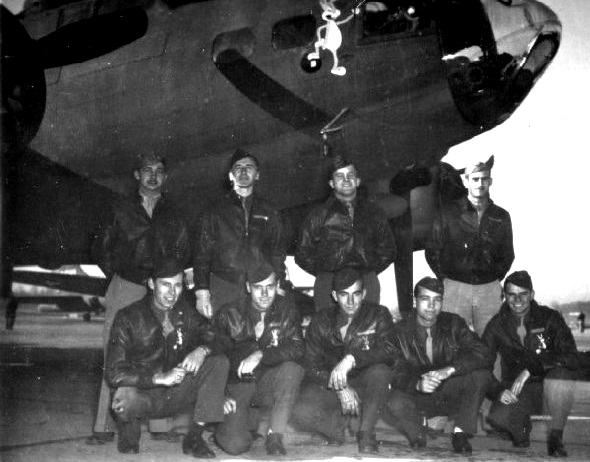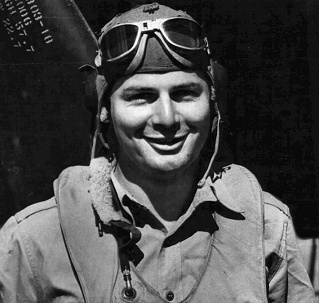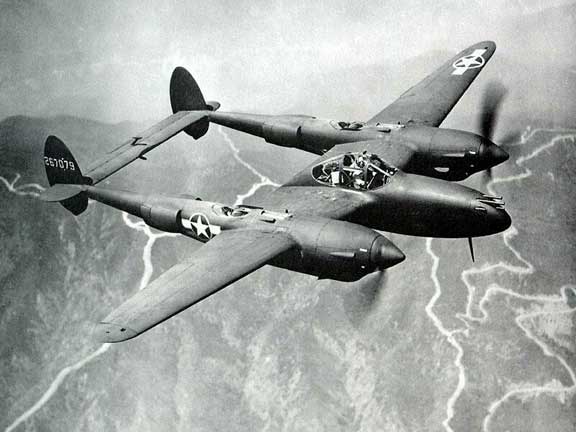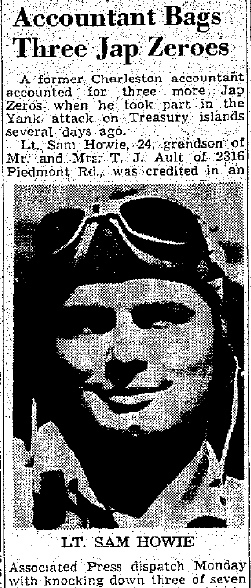The wonderful photo above was
submitted by the nephew of one of the pilots pictured :
William Goetz (above) is the Uncle of John Goetz, who's
family has had this photo for many years. On 03 Jan
43, while piloting mission #9 to St. Nazaire, France
in a B-17 , William Goetz's plane blew up in mid-air
during a fighter attack over St. Nazaire. All 10 crewmen were
KIA. No part of the aircraft has ever been found.

William Goetz,
back row on the left.

It's also interesting to note
that one of the other pilots is the famous Herbert J. Thomas,
for whom the Thomas Memorial Hospital is named after.
For those who may not know, Herbert J. Thomas
Jr. (February 8, 1918 - November 7, 1943) was a Sergeant in
the United States Marine Corps and a Medal of Honor recipient
for his heroic actions during World War II. Sergeant Thomas
was posthumously awarded the Medal of Honor for his actions
during combat versus Japanese forces on the Solomon Islands
(on November 7, 1943). Thomas actually enlisted in the
Army Air Corps, but transferred to the Marines because many
of his friends were in that branch of service.
The photo was taken by the
Army Air Corp and was published in the Charleston Daily Mail
Sept 1941.
There are family members around
the state that might not have a copy of this photo.
If you'd like to print a copy, click on the link under
the photo and it will enlarge suitable for printing.
If you have any other photos you'd like to add to this page,
contact me. |
And now another special treat: 
Click here for a larger photo of Sam This is Charleston Native Samuel T Howie. Bet you never heard of him. Sam shot down 3 Japanese Dive Bombers in one fight, flying a Lockheed P-38 Lightning 
He also shot down a Japanese Zero flying the same plane. Sam
Howie was born and raised in Charleston in 1918. His father died
when he was 2, so his mother had to raise him and his siblings alone.
They lived on Washington Street E, Ruffner Hollow, and
Piedmont Road near the Capitol. Times were tough, the depression
had hit, and yet Sam's mother managed to place him in Sacred Hear
Catholic School from 1st grade until 11th grade. The money
finally became even more scarce and so Sam spent his last year at
Charleston High and graduated there. He attended a couple of
small colleges including Morris Harvey, but didnt graduate. The
war was about to begin.... Sam
had taken a ride at Glenn Clark's seaplane base at the levy, and
thought it was pretty neat. So being drafted, he took the test to
become a pilot and passed with flying colors. He was sent to
California (as most of our local pilots were) for training. Soon,
he found himself over the Solomon Islands near Guadalcanal.
It was here that he shot down the 4 Japanese aircraft, 3
in one fight. This was in 1942. The P-38 sported four 50 cal
machine guns and a 30mm cannon. He told me that he used them to
their fullest. The government decided that Sam would be of great service to the cause in training pilots in the U.S. His
battle time was up anyway and he was transfered to several air bases in
the U.S. The first base was in Michigan where he trained the graduates
of Tuskegee, who needed experience in real fighter aircraft, and would come to be known as the
Tuskegee Airmen. At the outbreak of World War II, Selfridge kept on turning out new units. It trained three squadrons
of the first all-black 332d Fighter Group, popularly known as The Tuskegee
Airmen. Distinguished Unit Citations : 332d Fighter Group: 24 March 1945: for the longest bomber escort mission of World War II Sam was later transferred to South Carolina, and
then North Carolina to train more pilots. When the
war was finally over, Sam left the military and never flew again.
He got a job with Reynolds Aluminum and moved to Florida, where
he has lived ever since.
|
He was one kill away from becoming an ACE, when he was called back to the states to train pilots.
339th Fighter Squadron

This appeared in the Gazette and Daily Mail, Nov 1st, 1943  
Sam
is now 92 years old and sharp as a tack. I had the pleasure of
talking to him by phone for 30 minutes. I told him that far too
many men like himself had been forgotten, and that I wanted to feature
him as a symbol of the many men that didnt make ACE, or died
trying.... |
|